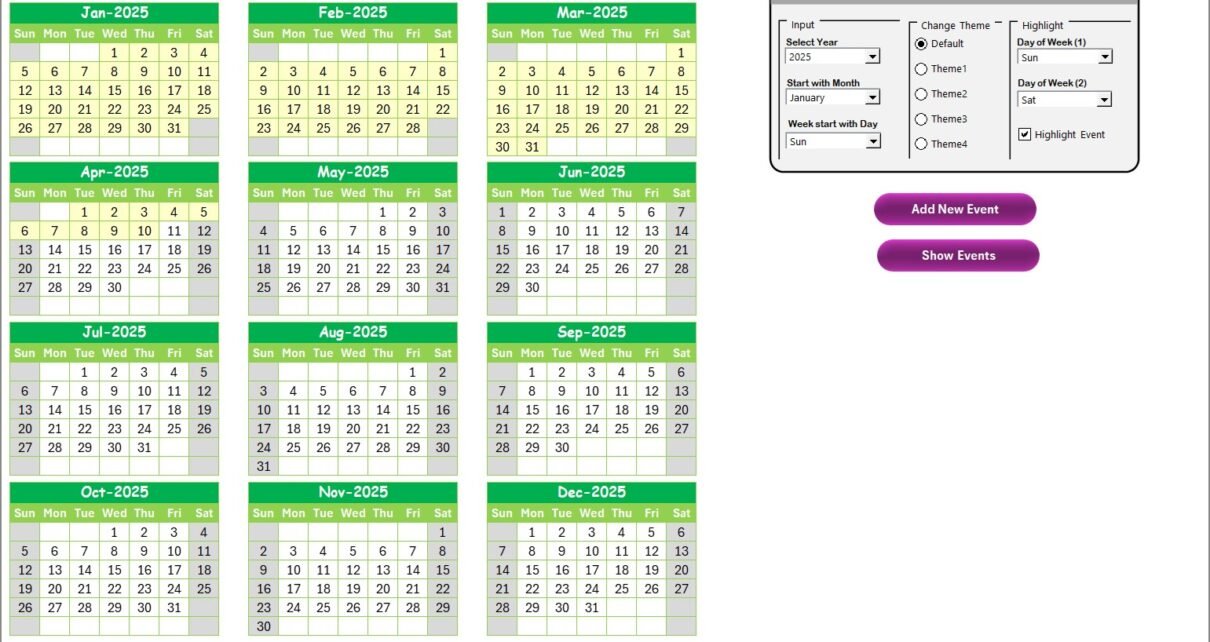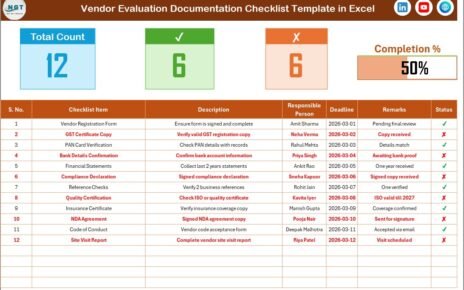In the dynamic world of education research and development (R&D), organizations deal with significant disruptions and supply chain challenges. Whether you work in academic institutions, education-based R&D centers, or innovation labs, your project timelines often face delays due to bottlenecks in procurement and resource delivery. In such situations, having a clear and dynamic Supply Chain Resilience Calendar becomes essential.
In this guide, you will learn everything about the Education R&D Supply Chain Resilience Calendar in Excel. This includes its purpose, key components, benefits, and implementation steps. You will also find practical tips, best practices, and common questions with answers.
Click to Purchases Education R&D Supply Chain Resilience Calendar in Excel
What is an Education R&D Supply Chain Resilience Calendar?
The Education R&D Supply Chain Resilience Calendar is a simple but powerful Excel-based tool that helps education institutions track and manage time-sensitive supply chain events. It displays the entire year in different views (annual, monthly, and daily) so that users can plan, update, and monitor all supply chain-related tasks effectively.
It covers essential events such as:
-
Procurement milestones
-
Delivery schedules
-
Vendor interactions
-
Resource allocation tasks
-
Risk management checkpoints
Why Do You Need a Supply Chain Resilience Calendar in Education R&D?
Traditional calendars only show dates. A Supply Chain Resilience Calendar shows critical events connected with your operational workflow. It helps you:
-
Stay proactive instead of reactive
-
Reduce downtime caused by delayed delivery
-
Make smart decisions based on current supply chain data
-
Maintain full visibility on key resources
-
Keep all stakeholders aligned with upcoming tasks
Click to Purchases Education R&D Supply Chain Resilience Calendar in Excel
Key Features of the Education R&D Supply Chain Resilience Calendar in Excel
The calendar contains 5 Excel worksheet tabs, each with a practical purpose:
Home Sheet – Navigation Made Easy
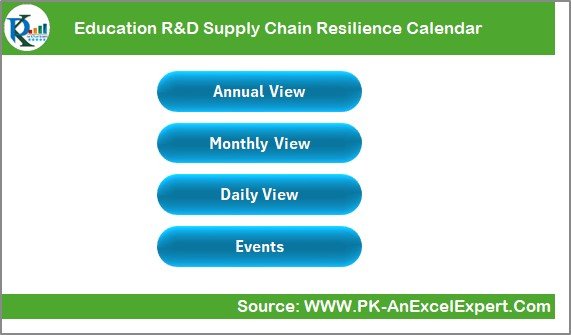
The Home sheet works as the index page. It includes easy-to-use buttons that allow you to jump directly to any part of the calendar:
-
Annual View
-
Monthly View
-
Daily View
-
Events
This reduces scrolling and simplifies navigation for new users.
Annual View – Full Year Visibility
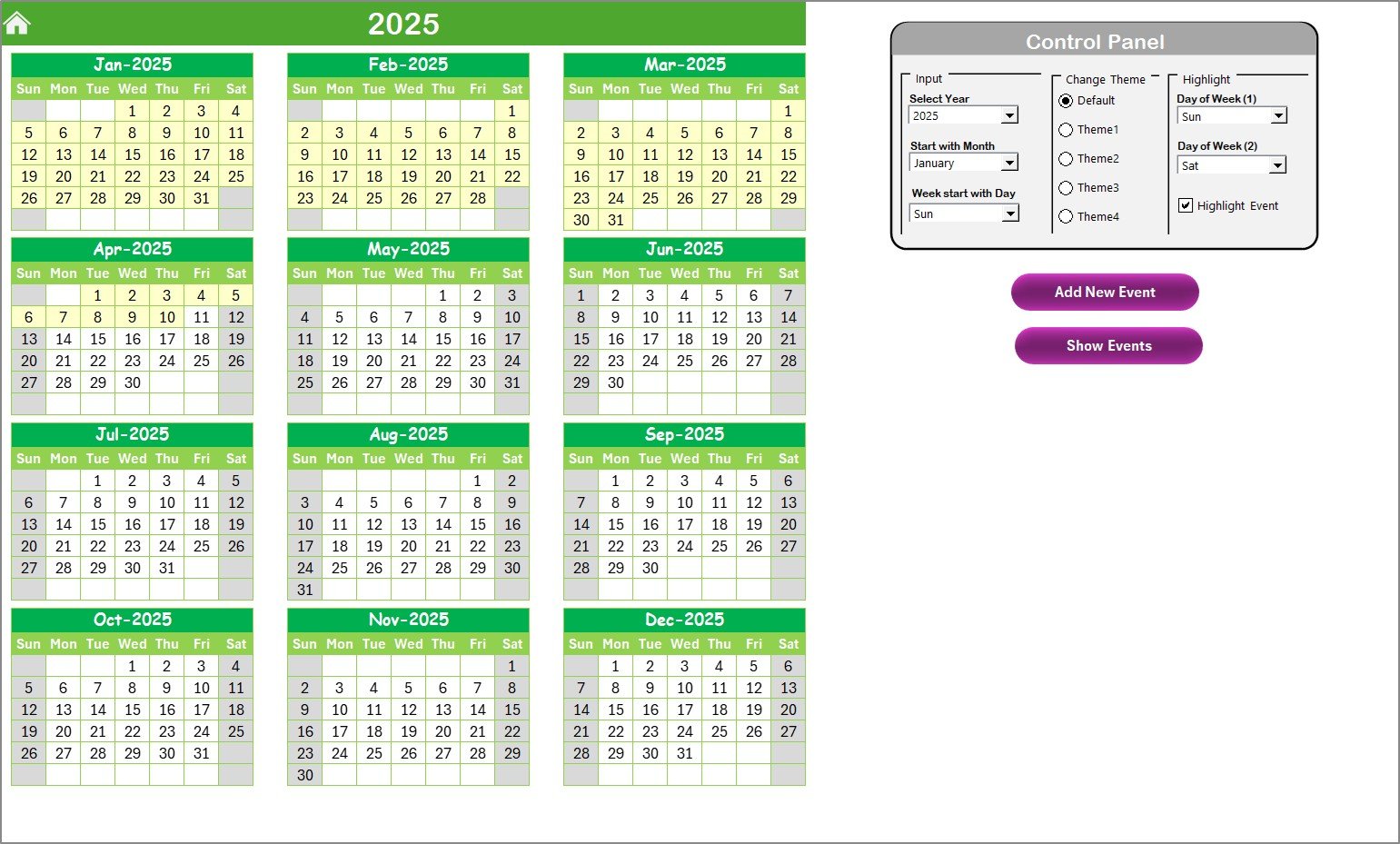
The Annual View Sheet shows all 12 months in a single workspace. It is perfect for senior managers who want a high-level overview of the full year.
Control Panel Highlights:
-
Input Group – Select the desired year, starting month, and first day of the week
-
Change Theme Group – Apply one of the 5 available color themes on the entire workbook
-
Highlight Group – Highlight any two specific days (e.g., Saturday & Sunday)
-
Highlight Events – Enable the feature to highlight events in yellow
Smart Buttons:
-
Add New Event – Opens a form to enter a new event (date, time, location, description)
-
Show Event – Displays the events list for the selected date
Monthly View – Focus on One Month at a Time
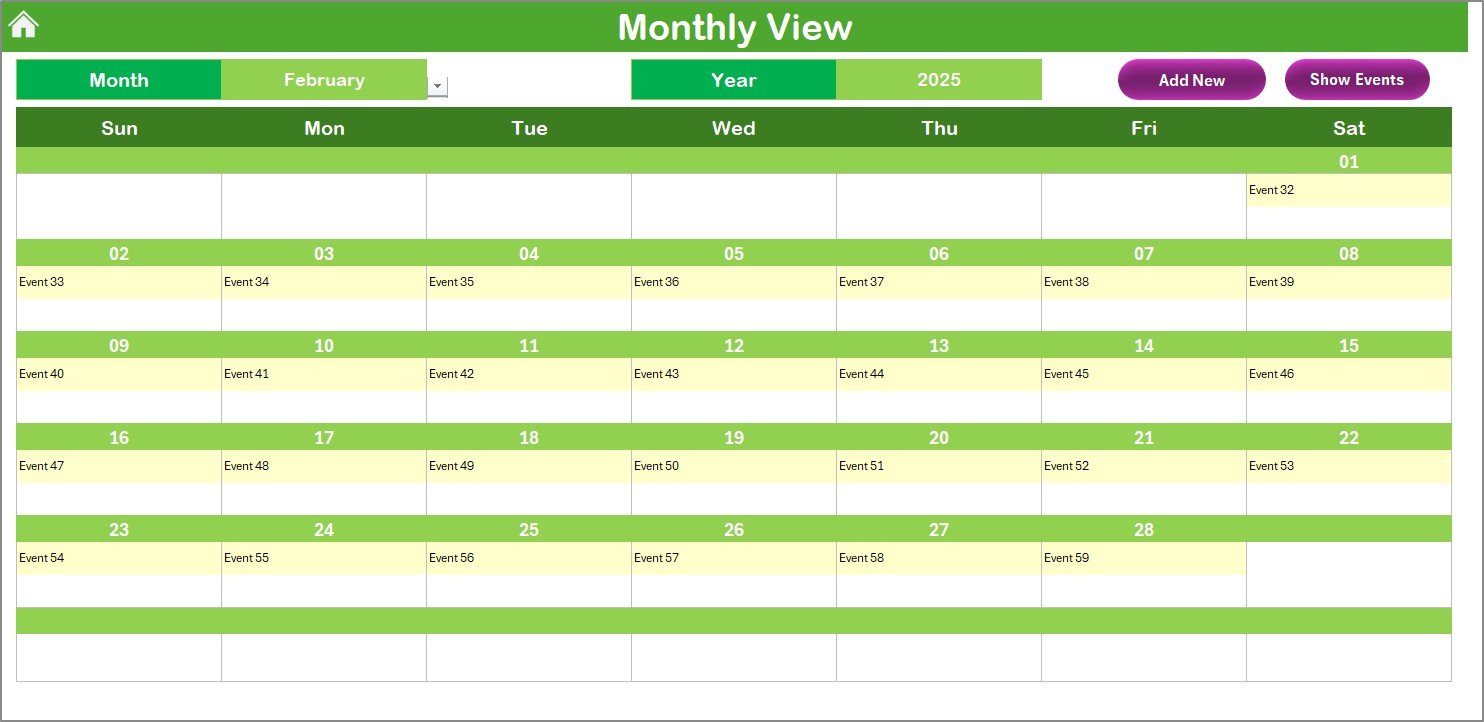
The Monthly View Sheet gives a detailed view of one selected month. It allows you to:
-
Choose Month/Year from dropdowns
-
See each day with events displayed directly inside the calendar
-
Detect overloaded days (appears as “more than 1…” when multiple tasks exist)
Available Buttons:
-
Add New Event
-
Show Event
Both functions behave in the same way as the Annual View but within the selected month only.
Daily View – Detailed Task Tracking

In the Daily View Sheet, users get the most detailed level. It displays all events inside a selected date range.
You can:
-
Select a Start Date and End Date
-
Click Refresh to update the view
-
Add events through the Add New Event button
This view is perfect for operational staff who need to work on day-to-day supply chain tasks.
Events Sheet – Central Data Repository
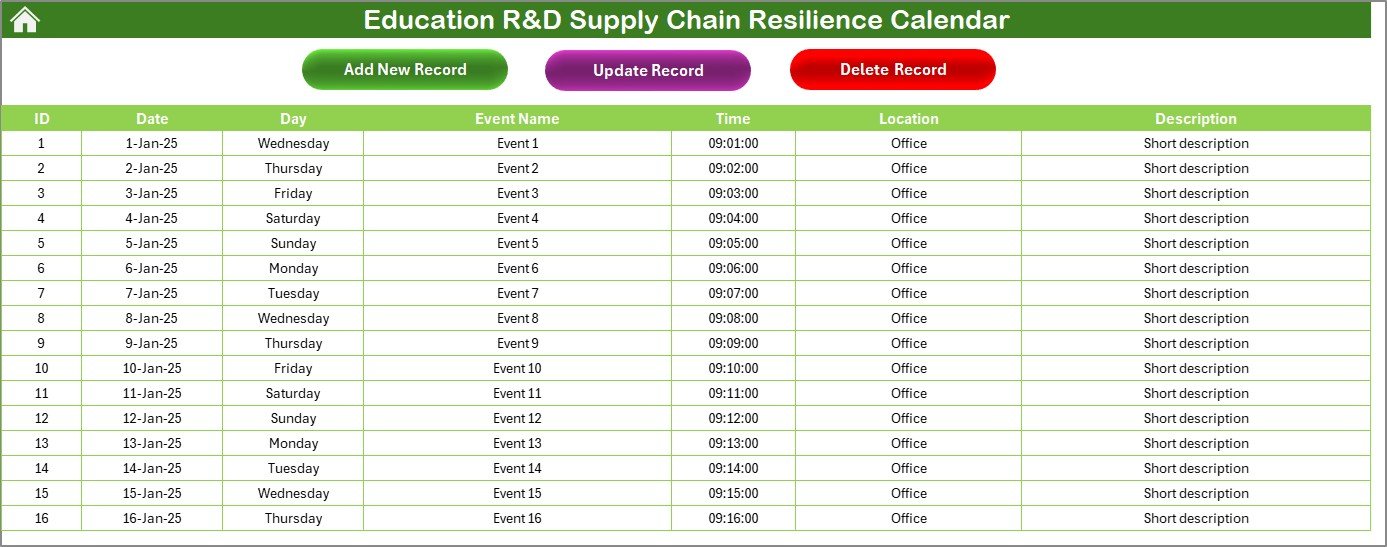
The Events Sheet stores complete information of all recorded events in a structured table. It includes the following columns:
Options Available:
-
Add New Record – Use form to enter details of a new event
-
Update Existing Record – Select record ID and update information
-
Delete Record – Remove the selected record easily
How to Use the Calendar (Step-by-Step Instructions)
Step 1 – Set Up the Home Sheet
Open the file and identify the Home sheet buttons. Familiarize yourself with the available views.
Step 2 – Customize the Annual View
Select the year, starting month, and desired theme.
Then choose which days you want to highlight (e.g., weekends).
Step 3 – Add Key Events
Use the Add New Event button to begin adding supply chain tasks, such as:
-
Material delivery
-
Approval submission
-
Procurement review meeting
Step 4 – Track Monthly Tasks
Move to the Monthly View and double-check upcoming events.
This is useful to see workload distribution and identify peak workload weeks.
Step 5 – Monitor Daily Progress
Switch to the Daily View to keep track of current events.
Filter the date range to match your team’s work period and update data regularly.
Step 6 – Update and Review Events
Use the Events Sheet to correct or remove outdated records.
Make sure every entry is up to date. This keeps all calendar views accurate.
Advantages of the Education R&D Supply Chain Resilience Calendar
-
Full Visibility – All activities are visible in one single file
-
Improved Decision Making – You can act quickly because you always know the current situation
-
Better Collaboration – Teams stay aligned and informed about key upcoming events
-
Time Saving – The Add/Update buttons reduce manual work
-
Customizable Interface – You can apply different themes and highlight critical days effortlessly
-
Scalability – Can be used by both small research teams and large education departments
How Does This Calendar Improve Resilience?
The calendar improves supply chain resilience by helping you:
-
Detect issues in advance (e.g., vendor delays, inspection gaps)
-
Assign responsibilities to the right team members
-
Add contingency events for potential risks
-
Control and monitor all milestones in real time
Best Practices for the Education R&D Supply Chain Resilience Calendar
✅ Update Events Daily – Make sure all information reflects the most recent status
✅ Highlight Critical Events – Use color highlights for high priority tasks
✅ Review Monthly View at the Beginning of Each Month – This will help your team plan in advance
✅ Conduct Weekly Reviews Using Daily View – This keeps all stakeholders aligned
✅ Assign Responsibility – Each event should have a clear owner
✅ Archive Completed Events Regularly – Remove outdated events to improve performance
Conclusion
Using an Education R&D Supply Chain Resilience Calendar in Excel is one of the most reliable ways to keep your supply chain efficient and flexible. It combines long-term annual planning with short-term operational control. In today’s fast-changing landscape, educational institutions cannot rely on fixed deadlines and static plans. This Excel calendar offers you a smart and proactive tool to keep your supply chain strong, predictable, and adaptable.
Frequently Asked Questions
Q1. Can I use this calendar for other departments outside R&D?
Yes. Although it is designed for Education R&D, you can use the same structure for procurement, maintenance, or any department that needs event tracking.
Q2. Do I need VBA knowledge to use this calendar?
No. All buttons and forms work automatically. You only have to enter the event data.
Q3. Can I add more columns to the Events sheet?
Yes. You can add additional fields (e.g., Responsible Person) as per your needs. The forms will still work with slight modification.
Q4. How often should I update the calendar?
Ideally, you should update it daily or at least after each key supply chain activity.
Q5. What happens if two events occur on the same day?
In Monthly View, it will show “more than 1…”. You can click Show Event to see the complete list of events on that date.
Visit our YouTube channel to learn step-by-step video tutorials
